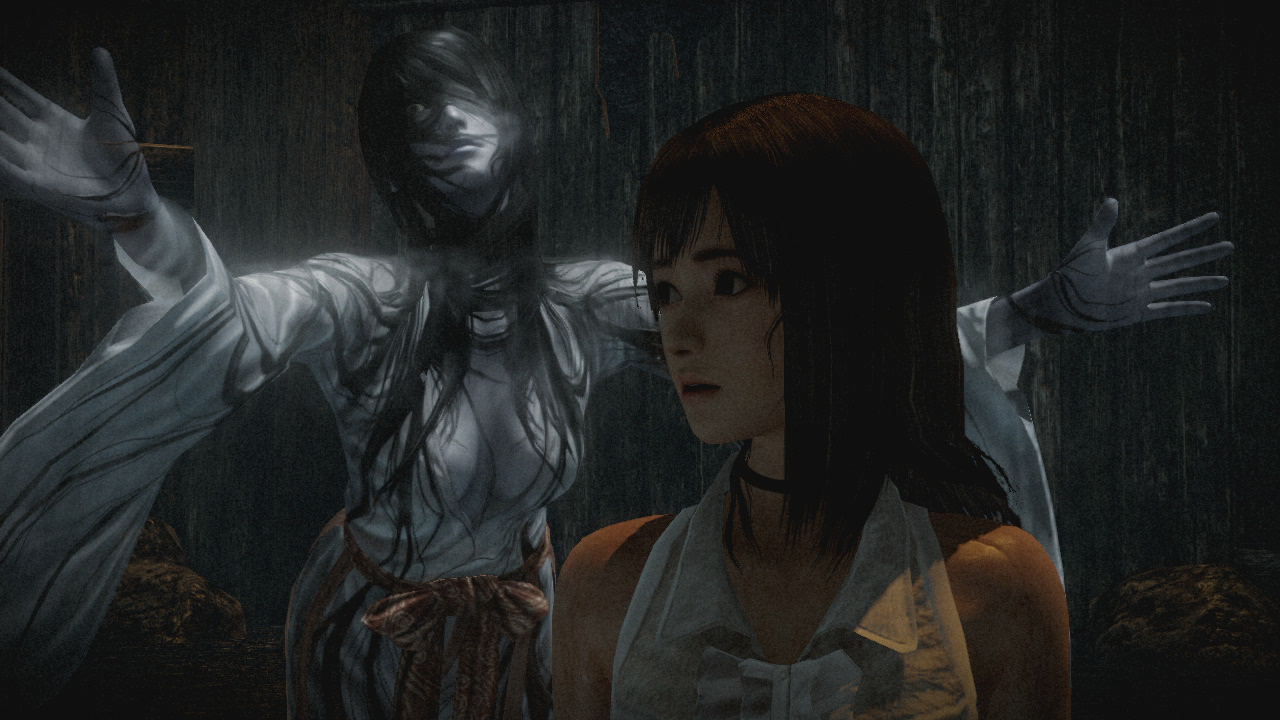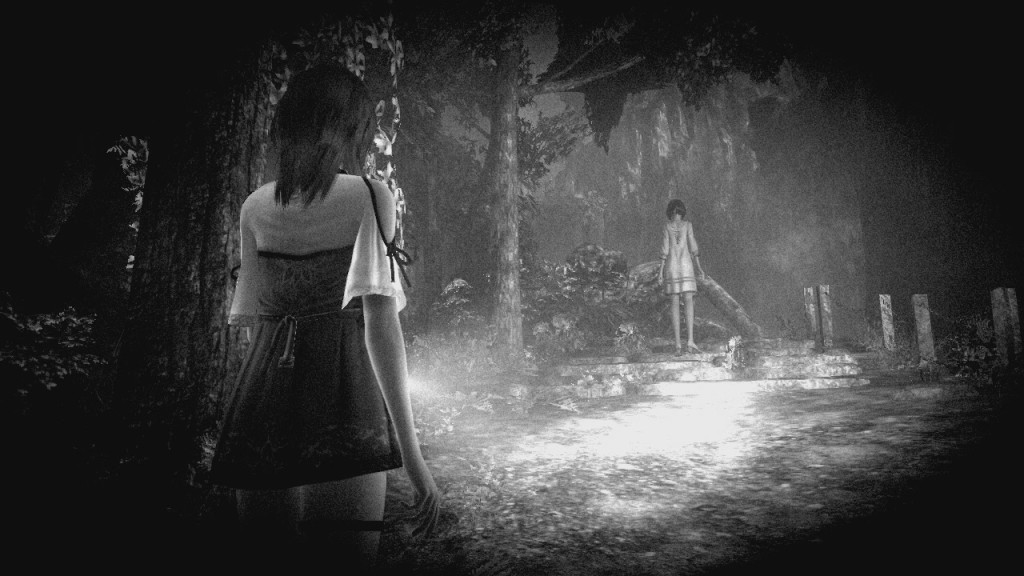Like the fetid stench from a long abandoned well, as unsettling as what looks like claw marks near its opening and damp footprints leading away from it towards your holiday cabin the woods. Project Zero (Fatal Frame in the US): Maiden of the Black Water is adept at creating unsettling scenes that stick with you a long time after you’ve put the controller down. Serving themes of loneliness and suicide with a healthy side order of unsettling ritualistic killings; Maiden of the Black Water weaves a bleak tale and doesn’t pull any punches in doing so.
The game’s three protagonists have all been drawn together under the shadow of Mt. Hikami – a former tourist destination that was all but destroyed by a landslide. The abandoned, decaying resort now plays home to a dense and winding fores, that has become a place many travel to in order to commit suicide, much like the real life forest of Aokigahara at the base of Mt.Fuji.
The trio are each investigating a string of mysterious disappearances at the mountain, which has long been rumored to be a conduit to the spirit world. Yuuri is a young psychic searching for her missing teacher that she believes was taken by angry spirits. Meanwhile Miu is searching for her mother, and finally Ren wants to unravel the meaning behind a disturbing recurring dream he keeps having, wherein young boy murders a young woman as part of a ritual sacrifice. Though the gameplay sadly doesn’t change much between each character, the game’s plot does progress at a fair lick and in interesting ways before coming together to form a cohesive and satisfying whole.
While each of the environments is initially quite impressive, with a nice mix of dilapidated tram stations, eerie ancient shrines filled with poppets, most interior areas (and the missions that take place in them) are all fairly linear. Basically follow the psychic trail of a ghost until you either find what you’re looking for or something nasty jumps out at you. Though the game does open up more once you’re tasked with searching outdoor areas. This is especially true of the game’s wooded areas, which contains multiple paths hiding various secrets and items. Of course the longer you linger in a certain area, the greater the chance a vengeful spirit will find you.
However the game’s biggest problem is that it soon feels repetitive as each character visits the same areas multiple times. Not only do you end up mooching around the same areas, which greatly decreases their ability to frighten you, as any sense of the unknown is lost, I’m also left to wonder if the game’s main characters are mentally defective as no one in their right mind would go anywhere near those sodding woods again after their initial run in with the nightmares incarnate that live there. It’s a shame too, because these repeated jaunts feel all the more like filler when stacked against Black Water’s more stand out moments, like a late game section in which you have to monitor security cameras to hunt for ghostly visitors while the other characters rest.
Though the exploration falls flat at times, the actual ghost zapping gameplay is superb. Naturally, you use the Camera Obscura to exorcise ghosts by taking pictures of them, as the one thing ghosts hate more than berks impersonating them with sheets, is being caught on film. As is standard in Project Zero the camera acts as your only defense, capturing the spirits on film so that they can no longer manifest in the physical world. Interaction with the camera is made all the more palpable and fun thanks to excellent use of the Wii U GamePad.
As the GamePad feels a lot like a giant camera anyway, and so it’s use as a stand in for the camera itself is hardly a taxing jump. Hold the Pad in front of you and with the touch of a button the game becomes first person, placing a viewfinder on the Pad’s screen and a vague sense of your direction on the TV. The controls are incredibly intuitive; flicking between walking around and shooting ghosts is fluid and really ramps up the tension as you’re forced to look away from the screen into the tiny viewfinder of the GamePad, to properly be able to take shots, immersing you further in the world of the game. If you aren’t a fan of motion controls, you can still use good old analogue sticks to aim the camera instead, something I found preferable when playing off-screen.
Certain elements of the game remain unchanged as series staples. As usual your trusty camera can also be upgraded by equipping different lenses that can instantly stun ghosts with each shot or restore a portion of your health. You’ll also come across better film as the game progresses which improves the cameras reload speed and damage. At the end of each chapter you’ll earn points based on your performance which can now be used to buy consumable items and further upgrades for your camera to improve its range and damage further. Whereas in previous games you can save your favourite photos, now you can share this photos in the Miiverse.
Despite the arcade like nature of the combat, Maiden of the Blackwater manages to retain its air of dread thanks to the suitably grotesque design of the angry spirits you encounter. From shambling, almost zombie like, corpses to unique characters that are often as tragic as they are intimidating. This is further emphasized by the “fatal glance”, which shows you a brief snippet of the character’s life, revealing the circumstances of their demise in gruesome and occasionally heartbreaking detail.
The world of Maiden of the Black Water is further fleshed out by collectable notes scattered throughout levels, each tiny snippet of information informing a wider narrative of ritual sacrifice and demonic possession.
The one part of the game that does really fall down though is the role that water effects your character. Basically the wetter each character gets, the more damage they’ll take from sprints and the more they’ll dish out in return. Though this sounds like a cool idea, the difference that being wet makes is negligible and it’s incredibly easy to manage the meter tied to it. Late in the game once you’ve stocked up on items that help to dry out your character it’s rendered completely pointless.
Despite this, the watery set pieces do still look phenomenal all the same and the game maintains a tense and oppressive atmosphere throughout. Thanks mainly to its excellent audio design as the sound of bubbling water, wind and the groan of the dead seep through the GamePad speakers, and distant ghosts drift by with no audio cues at all; building a pervasive sense of horror. Classic films like The Ring, Darkwater and The Grudge are obvious sources of inspiration as well as the work of manga artist Junji Ito when looking at some of the game’s more bizarre creations.
The game has also been fully dubbed in English, though to be honest this is one of the times I’d recommend playing the game with the original Japanese, as the English VO is a little grating at times and feels at odds with the rest of the games presentation. Despite the mostly strong presentation, there were some graphical hitches during my play through as the framerate occasionally drops to a crawl, while pop-in when moving to new areas was also common.
Continuing the trend started by Bayonetta, various skimpy Nintendo themed costumes and accessories can be unlocked after your first play through, such as Zelda and Zero Suit Samus, if you want to turn the game from a traditional Japanese ghost story into more of a Nintendo themed Carry On film.
With multiple endings, extra gameplay sections and higher difficulties to unlock, as well as the aforementioned costumes there’s plenty to do even post credits and your first play through should clock in at over ten hours to begin with anyway.
Project Zero: Maiden of the Black Water is another fine addition to the series, though it doesn’t quite reach the levels of nerve shredding terror of its immediate predecessor (here’s hoping for a western VC release a la Earthbound Origins). It still finds its feet thanks to what is possibly the darkest narrative in the series, coupled with some welcome innovation, through the use of the WiiU GamePad. Though some technical hick ups and repeated use of the same environments do mar the experience at times. On the whole Project Zero: Maiden of the Black Water is a welcome return to western shores of one of Japans best horror series, and with the first two chapters available to download for free via the eShop there is literally no excuse to not at least dip your toe in to this watery tale of suicide and ritual sacrifice.




